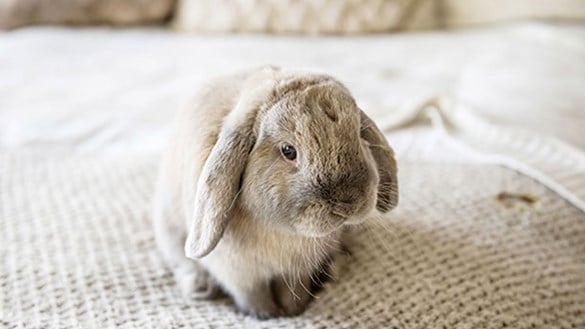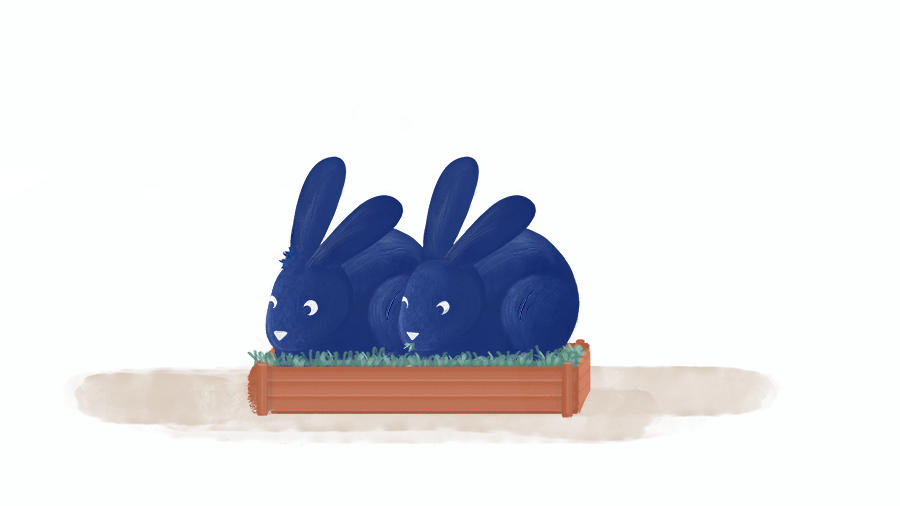How To Tell If Your Rabbit Is Blind Or Deaf
Rabbits can suffer from sensory difficulties, including blindness and deafness. Learn how to identify the problem and how to care for them.

Sensory difficulties can arise in rabbits for a variety of reasons, including as a result of birth defects, illnesses and injuries.
These conditions can have a massive effect on your rabbit’s quality of life, and your regular care routine will need to adapt significantly to suit their needs.
While there are a number of sensory disabilities that can affect rabbits, the most common conditions are deafness and blindness.
Deafness in rabbits
What causes deafness in rabbits?
While they may be known for their large ears, rabbits can become deaf for a number of reasons:
- Deaf since birth
- A result of injury
- A result of old age
- An untreated infection
- An ear mite infestation
- A parasitic infection (e.g. E.Cuniculi)
How to tell if your rabbit is deaf
As a prey animal, rabbits are highly responsive to noise. If you find that your rabbit isn’t responding to loud or unusual noises, this could be an indication that they may be deaf or losing their hearing.
Food is often very emotive for rabbits, so if they don’t appear to react to their food being shaken, this could also be indicative of deafness.
Rabbits can move their ears in different directions to help amplify sounds. If they no longer move their ears around in the direction of a noise, they could be deaf. Bear in mind that if they’re in a group of other rabbits, their ears may still swivel as part of mirroring behaviour, rather than as a response to sound.
Deaf rabbits may also become much more aggressive towards humans. This is due to being easily startled and stressed by unexpected or sudden movements.
Caring for a deaf rabbit
While wild rabbits struggle to cope with deafness, due to their reliance on their hearing to evade predators, their domesticated cousins often adapt well and can live happy, healthy lives with the right care.
Rabbits have almost 360-degree vision with the exception of two blind spots: one directly in front of their head and another immediately behind their head. They can still be startled by sudden, unexpected movement, so always approach your rabbit in a way that allows them to spot you as early as possible.
Avoid picking up your rabbit if they haven’t seen you, and establish a routine for approaching them in a calm, slow manner. Additionally, don’t leave them unattended in an open garden, as this can put them in danger of predator attacks.
If you suspect your rabbit may be deaf, speak to your vet – they’ll be happy to assess your rabbit’s hearing and diagnose the cause of the issue.

Blindness in rabbits
What causes blindness in rabbits?
Blindness in rabbits can be caused by a number of reasons, including:
- Age
- Genetics
- Cataracts
- Abscess
- Tumours
- Trauma
- Glaucoma
- Parasites (i.e. E.cuniculi)
Is your rabbit blind?
Your rabbit may be blind or partially sighted if they regularly bump into things or if they’re easily startled by sounds or approaching objects.
They may also make slow, cautious movements and become nervous in new places. Many visually impaired rabbits tend to stay close to the wall when exploring.
As well as changes in their behaviour, you may also notice physical signs of eye problems like swelling or redness around the eye, receding eyeballs, and dilated or cloudy pupils.
Caring for a blind rabbit
Some causes of blindness, including cataracts and glaucoma, come on gradually, so you should always speak to your vet about the best way to help slow the process.
It’s important to keep their environment consistent to avoid bumps and to minimise stress levels. That means keeping things like water bowls and litter boxes in the same place and removing any obstacles or dangerous objects.
Whether they’re an indoor or outdoor rabbit, make sure you bunny-proof their environment to keep them safe and secure, bearing in mind that blind rabbits tend to chew more as a way of investigating their surroundings.
Try to maintain a routine with regular feeding and cleaning times so your rabbit knows when to expect you. Blind rabbits rely heavily on their sense of smell, so avoid wearing intense perfumes or using strong candles and home fragrances.
Rabbits can adapt remarkably well to have little to no sight, and often live a fulfilled and happy life with the right amount of care.
For more advice and information about caring for rabbits with sensory difficulties, speak to your nearest Medivet practice.

Medivet Healthcare Plan
On average our clients save up to £280 each year with the Medivet Healthcare Plan.
Learn more

Pet Care & Advice
At Medivet, we’re committed to providing trustworthy, expert advice that helps you care for your pet.
Search advice

